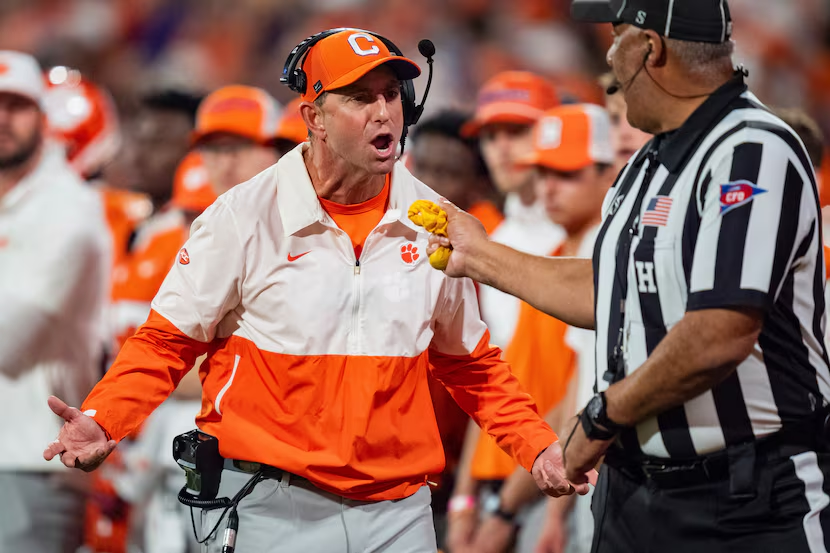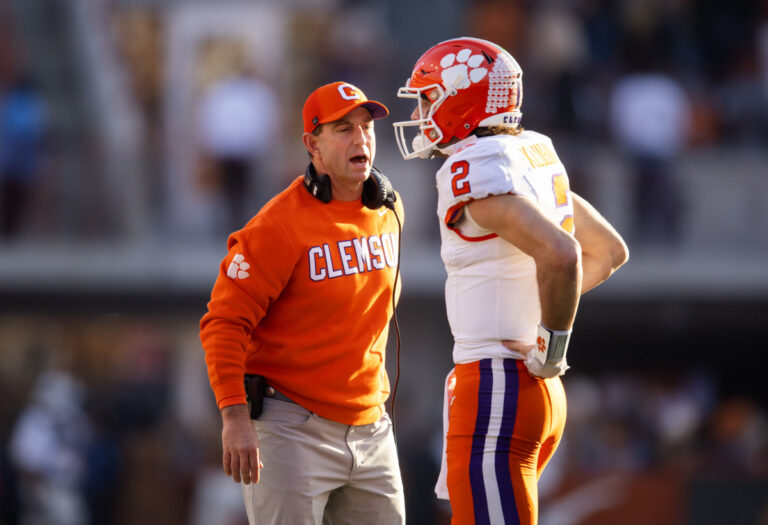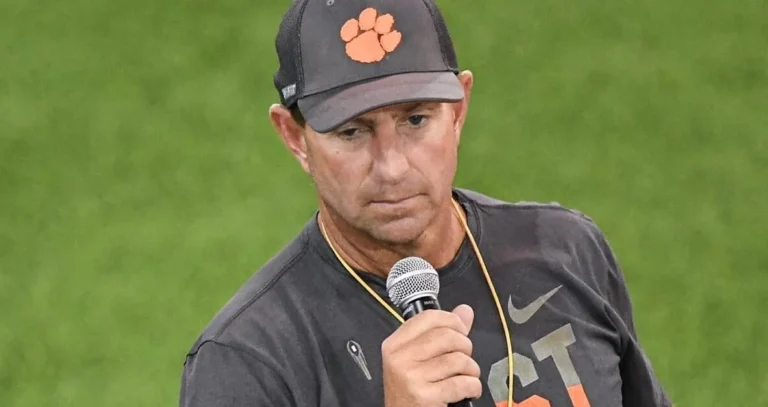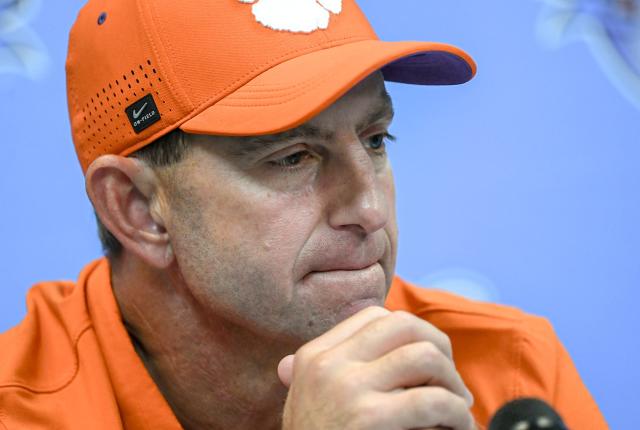
In Light of Clemson Football’s CFP Loss to Texas, Would Dabo Swinney Replace His Senior Coach?
The stage was set for an intense College Football Playoff (CFP) battle between the Clemson Tigers and the Texas Longhorns. Clemson, under the leadership of head coach Dabo Swinney, entered the game with high expectations. The Tigers had fought through a challenging season and were looking to solidify their place in college football history with another championship. However, things didn’t go as planned. In a stunning loss to Texas, Clemson’s national championship hopes were dashed, and questions arose about the future of the program.
Among the most pressing questions was whether Dabo Swinney, who has built Clemson into a powerhouse over the past decade, would consider making a dramatic change to his coaching staff. Specifically, fans, analysts, and insiders began wondering: Would Swinney replace his senior coach, someone who had been integral to the Tigers’ success, in light of the playoff loss?
This article explores the implications of Clemson’s CFP loss to Texas and the possibility that Dabo Swinney might consider such a significant change. We will look at the current dynamics of Clemson’s coaching staff, analyze the impact of the loss, and explore the potential outcomes of making such a move at this critical juncture in the program’s history.
Clemson’s Historic Success Under Dabo Swinney
Before delving into the hypothetical scenario of replacing a senior coach, it’s important to appreciate the magnitude of the success Dabo Swinney has had at Clemson. Since becoming head coach in 2008, Swinney has built one of the most dominant programs in college football. The Tigers have won two national championships (2016, 2018), appeared in the College Football Playoff multiple times, and consistently been a contender for the ACC title.
Swimmy’s reputation as a coach is defined by his ability to recruit top-tier talent, develop players into NFL-caliber athletes, and instill a strong team culture. His leadership has turned Clemson into a household name in college football, and his philosophy of putting “family” first has resonated deeply with players and fans alike. But, as with any elite program, success brings expectations, and expectations bring pressure.
The Loss to Texas: A Defining Moment
The CFP loss to Texas in the 2024 season was a stunning setback for Clemson. On paper, the Tigers had all the ingredients for another championship run—talented players, a seasoned coaching staff, and a system that had proven successful in the past. Yet, in the high-stakes environment of the College Football Playoff, Texas outperformed Clemson in several critical areas, including offensive execution, defensive strategy, and special teams.
Texas, led by their own experienced coaching staff and a dynamic offense, made key adjustments throughout the game, exploiting some of Clemson’s weaknesses. Despite a late-game rally, Clemson’s offense, which had struggled at times throughout the season, faltered when it mattered most. This loss not only marked the end of their playoff run but also sparked a wave of criticism from fans and media alike.
While losses in the CFP are never easy to digest, this particular defeat seemed to resonate more deeply because of the manner in which it unfolded. Clemson was outplayed in crucial moments, and the Tigers’ once-dominant offense was exposed as being less versatile than Texas’ attack. Clemson’s defense, which had been one of the program’s strongest units in recent years, seemed unable to contain the Longhorns’ explosive plays when it counted.
For Dabo Swinney, the loss was a bitter pill to swallow. After building a dynasty at Clemson, the playoff defeat was a stark reminder of the ever-changing landscape of college football. With the program facing heightened expectations, the question arose whether a coaching change—specifically replacing a senior coach—was necessary to reset and rejuvenate the team moving forward.
The Role of the Senior Coach
The “senior coach” in question is typically a veteran member of the coaching staff, one who has been with the program for an extended period and has contributed significantly to the team’s success. In Clemson’s case, this senior coach could be someone like Brent Venables, who was the Tigers’ defensive coordinator for years before leaving for a head coaching job at Oklahoma, or Tony Elliott, who had been the offensive coordinator before accepting a head coaching role at Virginia.
The loss to Texas may bring into question the effectiveness of some of these key staff members. If the Tigers’ defensive game plan faltered, many will point to the coaches responsible for scheming and preparing the defense. If the offense struggled, as it did in parts of the game, eyes will naturally turn to the offensive coordinator and the role they played in the game’s outcome. While Swinney is often seen as the leader of the team, the performance of his senior coaches plays a significant role in the overall success of the program.
For Dabo Swinney, replacing a senior coach is not a decision he would take lightly. Swinney has always valued continuity and loyalty within his coaching staff, as evidenced by his long-standing relationships with assistants. However, as the game of college football evolves and as Clemson faces new challenges, the question must be asked: Is it time for a change?
The Argument for Replacing a Senior Coach
There are several factors that would make replacing a senior coach at this juncture seem like a viable option for Swinney and the program.
- The Need for Innovation College football is an ever-evolving game. While Clemson has been successful over the past decade, many believe that the game has changed in ways that require new approaches. The rise of the transfer portal, the prevalence of NIL deals, and the increasing importance of offensive innovation have all dramatically altered how teams recruit, develop, and play football. Some may argue that Clemson’s senior coaches—who have been with the program for a long time—may not be keeping up with the latest trends and strategies in college football.
For example, the Tigers’ offense, once known for its high-powered passing attack and dynamic running backs, has seemed less potent in recent years. Some have pointed to Clemson’s offensive coordinator and the lack of diversity in the playcalling, especially in big games like the CFP loss to Texas. In a world where teams are increasingly leaning on up-tempo offenses, explosive passing games, and mobile quarterbacks, Clemson’s more traditional approach has occasionally been caught flat-footed.
Swinney might recognize the need to bring in fresh ideas, innovative strategies, and a new offensive philosophy to keep up with the competition. Replacing a senior coach could be the catalyst needed to reinvigorate the program’s approach to the game.
- Accountability for Underperformance While Clemson’s success under Swinney has been remarkable, the recent CFP loss has highlighted areas of underperformance. The Tigers’ inability to capitalize on key opportunities and their struggles to adjust to Texas’ game plan reflected poorly on the coaching staff. Swinney is known for holding his players and staff accountable, and it’s possible that he may feel the need to make a change in order to maintain that accountability at the highest levels.
By replacing a senior coach, Swinney could send a message to the entire staff that underperformance—particularly in high-pressure situations like the CFP—is not acceptable. It would show that no position or coach is untouchable, and that maintaining Clemson’s elite status requires constant self-evaluation and improvement.
- The Future of Recruiting College football is increasingly defined by recruiting and roster management. With the advent of the transfer portal and NIL deals, recruiting has become a more complex and competitive landscape. If Swinney feels that his senior coaches are not bringing in the level of talent necessary to remain at the top, he might consider replacing them in order to improve recruiting efforts. For example, a new offensive or defensive coordinator with fresh ideas and connections could potentially open new recruiting pipelines and help keep Clemson competitive in the increasingly competitive world of college football.
- The Need for Fresh Leadership Sometimes, a change in leadership is necessary to re-energize a program. While Dabo Swinney has been the face of Clemson football for years, the departure of a senior coach could bring a fresh perspective to the team’s approach. This could be particularly valuable for the players, who may benefit from new ideas, approaches, and leadership styles. A new coach could also help reframe the program’s culture, inspiring the next generation of Tigers to continue Clemson’s success.
The Case Against Replacing a Senior Coach
Despite the arguments in favor of change, there are also compelling reasons why Dabo Swinney may decide against replacing a senior coach following the loss to Texas.
- Loyalty and Stability Swinney has always prioritized loyalty and stability within his coaching staff. His long-standing relationships with his assistants, including those who have been with him since the early days of his tenure, have been a key factor in the program’s success. Replacing a senior coach could disrupt the stability that Swinney has worked so hard to establish. In a sport as volatile as college football, continuity is often a cornerstone of success, and Swinney may prefer to stick with his trusted staff, even in the face of one setback.
- The Nature of College Football In college football, losses happen. Even the best teams experience setbacks. A single loss in the College Football Playoff, while disappointing, does not necessarily indicate a systemic failure within the coaching staff. Swinney may recognize that a long-term, successful program goes through ups and downs, and that replacing a senior coach after one loss may be an overreaction. Stability, continuity, and long-term planning could outweigh the impulse for a change driven by a single game.
- The Coaching Staff’s Success While the loss to Texas was certainly a disappointment, it’s important to remember the broader context of the program’s success under Swinney’s leadership. Clemson’s coaching staff has been responsible for guiding the Tigers to multiple national championship games and conference titles. The senior coaches have played an integral role in building the program into one of the top teams in the country. Replacing them based on one loss might be viewed as unfair and counterproductive, especially considering their track record of success.
Conclusion: Is a Coaching Change on the Horizon?
In the wake of Clemson’s CFP loss to Texas, it’s clear that questions about the future of the coaching staff are warranted. While the Tigers’ performance on the big stage was underwhelming, it’s also important to recognize that one defeat does not define a program’s trajectory. Dabo Swinney may decide that a change in leadership is necessary to bring fresh ideas and renewed energy to the team, but he may also choose to remain loyal to his staff and trust in the long-term success they have built together.
For now, Clemson’s future remains uncertain, but one thing is clear: Dabo Swinney’s leadership, vision, and decisions will continue to shape the program for years to come. Whether he chooses to replace a senior coach or stick with his current staff, the legacy of Clemson football is far from finished. Only time will tell what direction the Tigers will take in the aftermath of this heartbreaking loss.






